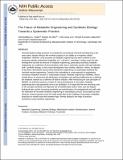The future of metabolic engineering and synthetic biology: Towards a systematic practice
Author(s)
Yadav, Vikramaditya G.; De Mey, Marjan; Kumaran Ajikumar, Parayil; Stephanopoulos, Gregory; Lim, Chin Giaw
DownloadStephanopoulos_Future metabolic.pdf (2.073Mb)
PUBLISHER_CC
Publisher with Creative Commons License
Creative Commons Attribution
Terms of use
Metadata
Show full item recordAbstract
Industrial biotechnology promises to revolutionize conventional chemical manufacturing in the years ahead, largely owing to the excellent progress in our ability to re-engineer cellular metabolism. However, most successes of metabolic engineering have been confined to over-producing natively synthesized metabolites in E. coli and S. cerevisiae. A major reason for this development has been the descent of metabolic engineering, particularly secondary metabolic engineering, to a collection of demonstrations rather than a systematic practice with generalizable tools. Synthetic biology, a more recent development, faces similar criticisms. Herein, we attempt to lay down a framework around which bioreaction engineering can systematize itself just like chemical reaction engineering. Central to this undertaking is a new approach to engineering secondary metabolism known as ‘multivariate modular metabolic engineering’ (MMME), whose novelty lies in its assessment and elimination of regulatory and pathway bottlenecks by re-defining the metabolic network as a collection of distinct modules. After introducing the core principles of MMME, we shall then present a number of recent developments in secondary metabolic engineering that could potentially serve as its facilitators. It is hoped that the ever-declining costs of de novo gene synthesis; the improved use of bioinformatic tools to mine, sort and analyze biological data; and the increasing sensitivity and sophistication of investigational tools will make the maturation of microbial metabolic engineering an autocatalytic process. Encouraged by these advances, research groups across the world would take up the challenge of secondary metabolite production in simple hosts with renewed vigor, thereby adding to the range of products synthesized using metabolic engineering.
Date issued
2012-02Department
Massachusetts Institute of Technology. Department of Chemical EngineeringJournal
Metabolic Engineering
Publisher
Elsevier
Citation
Yadav, Vikramaditya G., Marjan De Mey, Chin Giaw Lim, Parayil Kumaran Ajikumar, and Gregory Stephanopoulos. “The Future of Metabolic Engineering and Synthetic Biology: Towards a Systematic Practice.” Metabolic Engineering 14, no. 3 (May 2012): 233–41.
Version: Author's final manuscript
ISSN
10967176
1096-7184